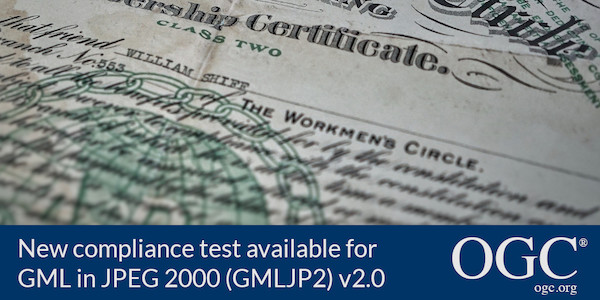Products that implement the GMLJP2 standard can now be tested and certified as OGC Compliant.

The Open Geospatial Consortium (OGC) is excited to announce that the Executable Test Suite (ETS) for version 2.0 of the GML in JPEG 2000 (GMLJP2) Part 1: Core encoding standard has been approved by the OGC Membership. Products that implement the GMLJP2 v2.0 standard and pass the tests in the ETS can now be certified as OGC Compliant.
Implementers are invited to validate their products using the new test suite, which is available on the OGC validator tool. Testing involves submitting a GMLJP2 file produced by the product being assessed. These tests typically take only 5-10 minutes to complete. Once a product has passed the test, implementers can submit an application to OGC for use of the OGC Compliant trademark on their product.
The GMLJP2 standard defines the means by which the Geography Markup Language (GML) is used within JPEG 2000 images for geographic imagery. GMLJP2 also provides packaging mechanisms for including GML within JPEG 2000 data files and specific GML application schemas to support the encoding of images within JPEG 2000 data files. JPEG 2000 is a wavelet-based image compression standard that provides the ability to include Extensible Markup Language (XML) data for description of an image within the JPEG 2000 data file.
GMLJP2 makes it possible to describe coverage instances (raster data) shown on a JPEG 2000 image. Coverages are used extensively in domains such as remote sensing, meteorology, defense, agriculture and mapping of bathymetry, elevation, soil, and vegetation.
To support developers of the GMLJP2 v2.0 standard, GDAL/OGR 3.0.0 has been designated a reference implementation of the standard after the software successfully passed the compliance tests.
The OGC Compliance Program is a certification process that ensures organizations' solutions are compliant with OGC Standards. It is a universal credential that allows agencies, industry, and academia to better integrate their solutions. OGC compliance provides confidence that a product will seamlessly integrate with other compliant solutions regardless of the vendor that created them.
More information about the OGC compliance process is available at https://www.ogc.org/compliance. Implementers of the GMLJP2 encoding standard – or other OGC standards – can validate their products using the OGC validator tool.
About OGC
The Open Geospatial Consortium (OGC) is an international consortium of more than 500 businesses, government agencies, research organizations, and universities driven to make geospatial (location) information and services FAIR – Findable, Accessible, Interoperable, and Reusable.
OGC's member-driven consensus process creates royalty free, publicly available geospatial standards. Existing at the cutting edge, OGC actively analyzes and anticipates emerging tech trends, and runs an agile, collaborative Research and Development (R&D) lab that builds and tests innovative prototype solutions to members' use cases.
OGC members together form a global forum of experts and communities that use location to connect people with technology and improve decision-making at all levels. OGC is committed to creating a sustainable future for us, our children, and future generations.
Visit ogc.org for more info on our work.
“
